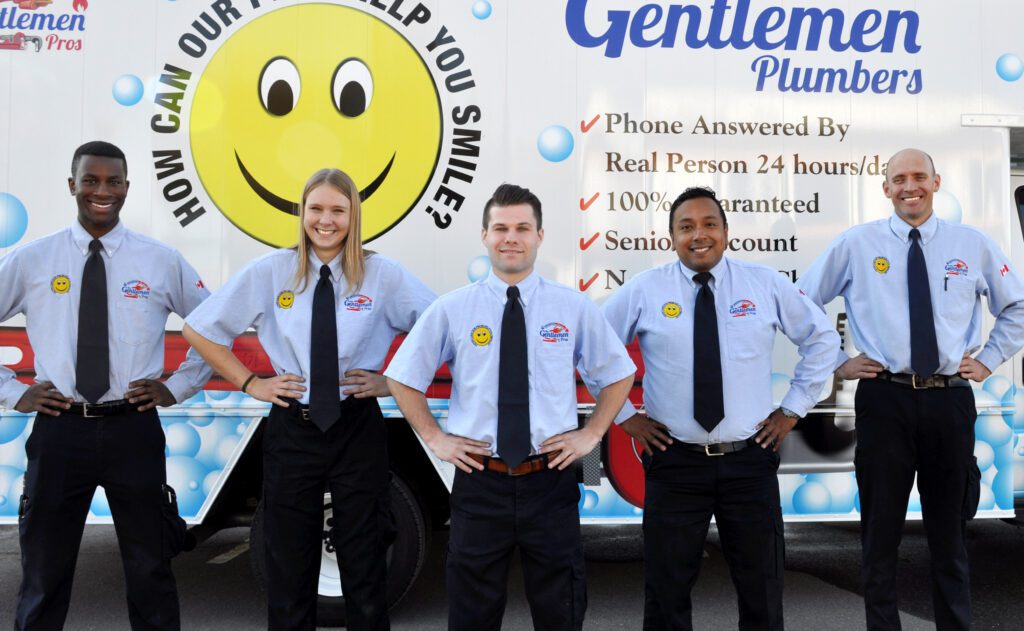
Same Day Service Since
2001
Call The Gentleman Pros Now!
(403) 879-1759
Flooding in Canada has increased 300% since the 1960s and is the most common natural disaster. The government of Canada estimates that 2 in 10 homes are at risk of flooding, and that only 6% of homeowners are aware that they are at risk of flooding.
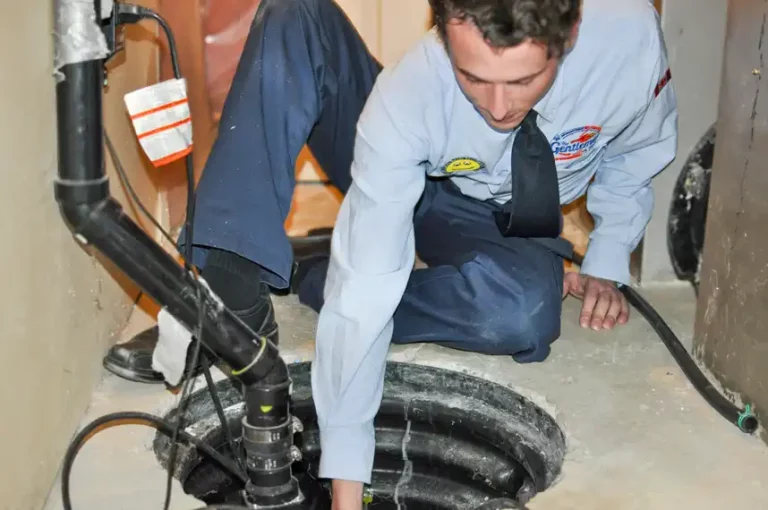
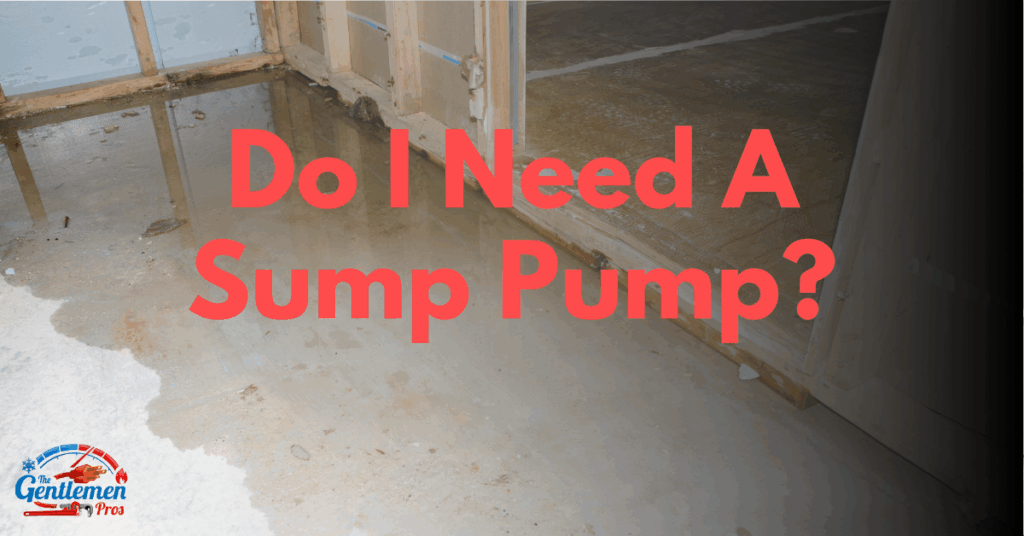
The purpose of a sump pump is to remove groundwater that seeps into the foundation of the home. Homeowners would be wise to install a sump pump or buy a home with a sump pump. Just like a smoke alarm, it may only be needed in an emergency, but it protects against rising groundwater during periods of rain or melting.
Sump pumps work by collecting water in the sump barrel, and then a pump moves the water outside through a discharge pipe.
Water collected by weeping tile and fingerlings around the perimeter of the home is directed into a channel.
The water channel leads into the sump barrel.
As the barrel fills, the floats inside the barrel signal the rising water and activate the pump.
The water collected in the sump barrel is pumped up and away from the house.

If you are uncertain if your home needs a sump pump, ask yourself the following questions:
Even if it was years ago, any flood history is a good indicator that you need a sump pump. Signs of flooding, including warped or discoloured baseboards, uneven or swollen flooring, could indicate past flooding.

Moist, musty smells or mildew could indicate groundwater seepage. Diligently look for the source of the water leak. Don’t be afraid to call a professional for help detecting a water leak.
Find out if your neighbours have a sump pump. If homes nearby need a sump pump, you may too. Consult neighbours and HOA to learn of flood histories in the neighbourhood.
With extreme weather like heavy rain, hail, or chinooks creating fast melts, your home may need extra protection to manage water surges.
Water may enter the cracks in the foundation. Repairing or mitigating water seepage will protect your home investment.

Homes built near a high water table should have a sump barrel and sump pump.
Often, community members know of the risk for flooding or proximity to a higher water table. In more extreme situations, a home may require a second sump pump with backup batteries and an alarm.
Water tables change depending on the time of year and can shift over time. Natural ground shifting or construction projects can cause underground streams to be diverted away from or towards your home.
Groundwater doesn’t discriminate based on the elevation of your home. Underground water systems can be found anywhere, including hills and mountains. (For example, underground water streams or springs at the top of mountains). Even if your home is built on a hill, you may need a sump pump and sump barrel.
No, sump pumps are often installed as a precautionary measure. There are many instances when a sump pump is never used. Consider a sump pump like a smoke alarm, a precautionary device to help prevent disasters.
Yes, you can retrofit a sump pump and barrel to an older home.
We recommend calling an expert for this job. Depending on the age of the home, a sump pump retrofit may require jackhammering a foot around the perimeter of the basement to add weeping tile to convey the water to the basement.
The water could also be conveyed to the sump barrel through a less intrusive method, so jackhammering a place for the barrel in the basement may be the only intrusive step.
There are many nuances and important details to know to install a sump pump correctly. Installing a sump pump is a big job. We recommend hiring an experienced, insured professional to install the sump pump and barrel.
Here are a few things to consider when installing a sump pump:
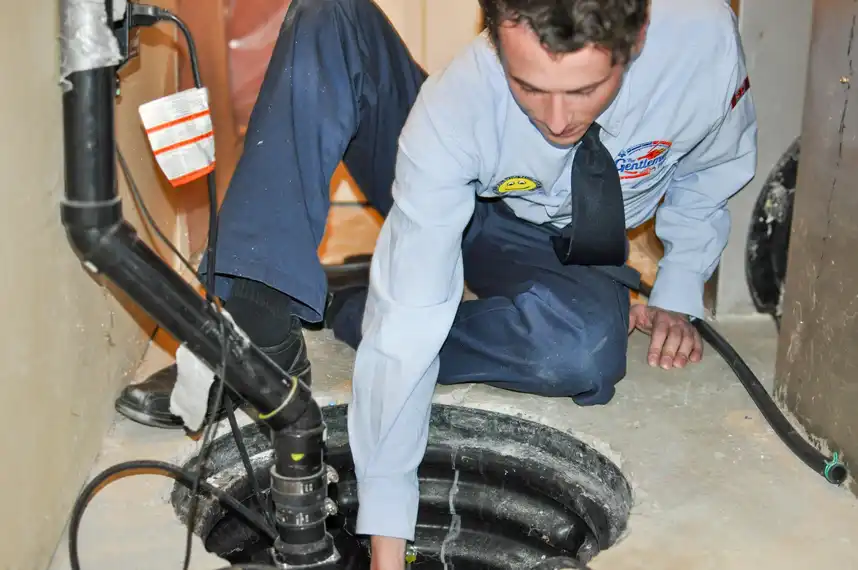
Knowing where to place the sump pump and barrel is important. They need to be placed near a water entryway so water can easily flow into the barrel.
Once the sump pump barrel has collected the water, the water needs to be pumped out. The pump needs to be near an outside exit so the water can be pumped away from the house.
Ideally, the collected water should be pumped at least 15 feet away from the house.
A barrier needs to be installed to prevent rocks, silt, and debris from entering the sump barrel. As the sump pump works, it pumps collected water away from the home. If rocks and silt enter the barrel, they could enter the pump and damage or ruin the pump.
Bigger is not necessarily better when it comes to the sump pump size and power.
A larger pump may be overkill. If a larger pump is not needed, it would operate on shorter cycles of time, causing the pump to turn off and on regularly, creating unneeded wear and tear.
A smaller pump that can keep up with the water flow is often the ideal choice. An experienced plumbing technician can help guide you to the right sump pump.
The discharge pipe (where water is pumped away from the home) must be at the right grade or slope. It is critically important that the water can flow downwards away from the home.
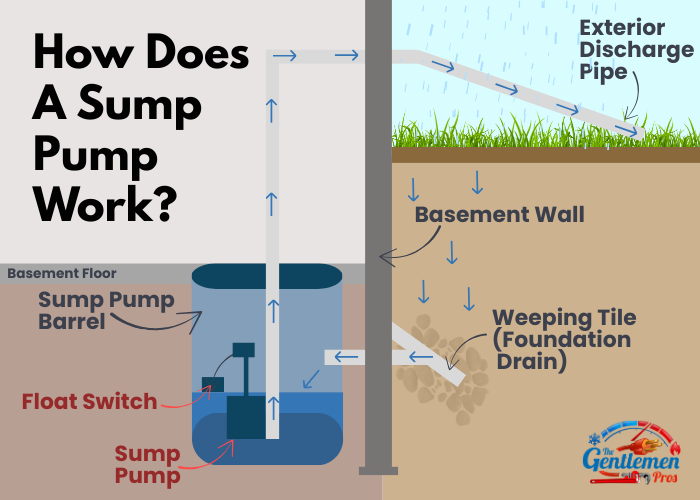
We recommend a regular home inspection from a plumbing technician. Yearly, the floats in the barrel should be tested to ensure they signal the pump to turn on. In Alberta, a good time to test is early in the spring, before the summer and spring rains.
If you join our membership club, The Gentlemen’s Promise, you qualify for a yearly plumbing inspection, which includes testing the sump pump. Learn more here about how members save money and protect their investment, with longer warranties and discounted services.
Read more about how you can Avoid and Prevent Sewer Backups here!
Learn about The History of Sewer Pipes in Calgary
Book here for a Sewer Line Camera Inspection
Schedule a service evaluation by calling The Gentlemen Pros today to prevent and repair your main sewer line problems.



